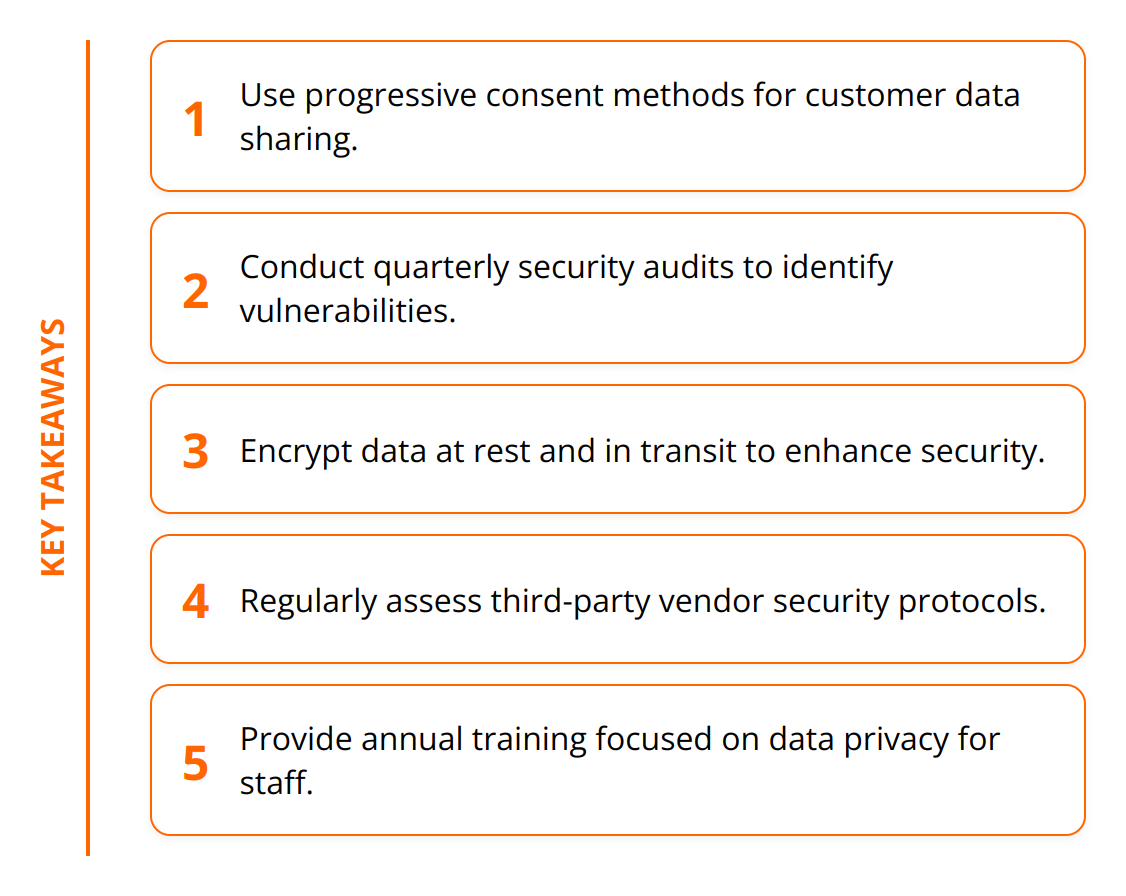
Customer loyalty data privacy is a priority for any business that values its customers.
At Reward the World, we recognize that safeguarding this data is essential for building trust, ensuring legal compliance, and protecting brand reputation.
This blog post explores the importance of customer loyalty data privacy, offers effective strategies for protection, and highlights common pitfalls to avoid.
Why is Customer Loyalty Data Privacy Important?
The importance of customer loyalty data privacy cannot be overstated. Protecting this data impacts multiple facets of a business, from customer trust to legal standing and brand reputation. Here are key aspects, backed by practical insights and tips to guide you.
Building Trust
Trust forms the foundation of customer loyalty. When customers share their data, they expect it to be handled responsibly. According to a study by Salesforce, 70% of consumers state they would stop doing business with a company if it misuses their data. There are a few immediate actions businesses can take:
- Transparency: Be clear about how customer data is collected, stored, and used.
- Consent Management: Use progressive consent methods which let customers decide what information they want to share.
- Communication: Regularly communicate data practices and updates, enhancing customer confidence.

Legal and Regulatory Compliance
Compliance with legal regulations such as GDPR and CCPA is non-negotiable. Failure to comply can result in severe penalties. The GDPR, for instance, can impose fines up to €20 million or 4% of annual global turnover. To comply effectively:
- Understand Regulations: Familiarize yourself with relevant data privacy laws, focusing on requirements specific to your industry and location.
- Employee Training: Educate staff on data privacy policies and secure handling practices.
- Audit Procedures: Conduct regular audits to ensure ongoing compliance.
Protecting Brand Reputation
A data breach can irreparably damage brand reputation, leading to a loss of customer trust and, ultimately, revenue. Studies show that 90% of consumers feel more confident in brands that protect their data effectively. Key recommendations include:
- Advanced Security Measures: Invest in robust security systems like encryption and multi-factor authentication.
- Vendor Evaluation: Regularly assess third-party vendors to ensure they comply with your data protection standards.
- Data Minimization: Only collect the data you need, and securely dispose of what you don’t.

For more insights on data privacy strategies, check out our post on GDPR compliance.
Building trust, ensuring legal compliance, and protecting your brand reputation are non-negotiable in today’s data-centric environment. Implement these strategies to safeguard customer loyalty data effectively.
How to Protect Customer Loyalty Data
Implementing strong security measures is vital for protecting customer loyalty data. Below are key strategies that provide practical steps and immediate actions.
Implement Strong Encryption and Access Controls
Encrypting customer data at both rest and transit can prevent unauthorized access. Advanced Encryption Standard (AES) is recommended for its robust security. Ensuring that only authorized personnel have access to sensitive data is equally important. Role-based access controls can be an effective way to limit data access to necessary personnel only.
Regularly Update Security Protocols and Software
Outdated software and security protocols can be weak points for cyberattacks. Regular updates and patches are non-negotiable for ensuring that your systems are protected against the latest threats. A survey by Cisco found that 31% of organizations face breaches due to outdated software. Automating updates can help in maintaining this crucial practice.

Conduct Routine Security Audits and Assessments
Regular security audits can identify vulnerabilities before they are exploited. Conducting these audits at least quarterly can help you stay ahead of potential threats. Consulting specialized firms for comprehensive security assessments can offer additional layers of scrutiny.
- Periodic Audits: Perform every quarter to catch and address issues early.
- Vendor Assessments: Ensure third-party vendors comply with your security standards.
- Incident Response Plans: Have a robust plan in case of a data breach.
For more insights on data protection, you can read about anti-fraud measures.
Security cannot be an afterthought. Implementing these strategies can significantly enhance the protection of customer loyalty data.
What Are Common Data Privacy Pitfalls?
An over-reliance on third-party vendors, lack of employee training, and slow response to data breaches are major pitfalls that can jeopardize customer loyalty data privacy.

Dependency on Third-Party Vendors
Relying heavily on third-party vendors for data management can be a double-edged sword. While they offer specialized services, vendors might not adhere to your data protection standards. A breach involving a third party still affects your brand.
- Vendor Evaluation: Regularly assess security protocols of vendors.
- Contractual Obligations: Include strict data protection clauses in contracts.
- Ongoing Audits: Perform periodic audits to ensure compliance.
Lack of Employee Training and Awareness
Employee negligence remains a significant risk factor. A study by Verizon found that 30% of data breaches involved internal staff errors. Proper training can mitigate these risks.
- Annual Training Programs: Conduct yearly training focused on data privacy.
- Regular Updates: Keep staff informed of the latest privacy regulations.
- Simulated Phishing Attacks: Use these to test and improve employee awareness.
Failing to Address Data Breaches Swiftly
The speed at which a company addresses data breaches significantly impacts its recovery. IBM’s Cost of a Data Breach Report reveals that breaches identified in under 200 days cost companies $1.23 million less on average.
- Incident Response Plan: Have a pre-defined plan to tackle breaches.
- Immediate Notification: Inform affected customers quickly to maintain trust.
- Forensic Analysis: Conduct thorough analysis to prevent future breaches.
Protecting customer loyalty data requires ongoing effort and vigilance. For additional tips on anti-fraud measures, see our anti-fraud tips.
Conclusion
Customer loyalty data privacy is pivotal for building trust, maintaining legal compliance, and safeguarding brand reputation. We’ve emphasized the necessity of transparency, consent management, and robust communication in fostering trust. Legal compliance with frameworks like GDPR and CCPA is equally important, evidenced by penalties up to €20 million or 4% of global turnover for non-compliance. Protecting your brand reputation demands advanced security measures, regular vendor evaluations, and data minimization practices.

Key strategies for protecting customer loyalty data include implementing strong encryption, regularly updating security protocols, and conducting routine security audits. Reliance on third-party vendors, lack of employee training, and sluggish breach responses can undermine these efforts. A proactive approach includes regular vendor assessments, comprehensive employee training, and having a swift incident response plan in place.
Continuous improvement in data privacy practices is critical. Stay updated, routinely reassess your strategies, and prioritize ongoing staff education. At Reward the World, we understand the importance of data privacy and provide a secure, GDPR-compliant platform to support your loyalty initiatives.
For more detailed insights on data protection and customer loyalty strategies, explore our extensive resources on GDPR compliance and anti-fraud measures.
Reward the World offers a turnkey solution for businesses aiming to foster customer loyalty and boost performance. Our award-winning platform delivers instant rewards across a diverse range of categories, seamlessly integrating with your systems to elevate customer engagement while ensuring cost-effective operations. Visit Reward the World to discover how we can transform your loyalty programs.
